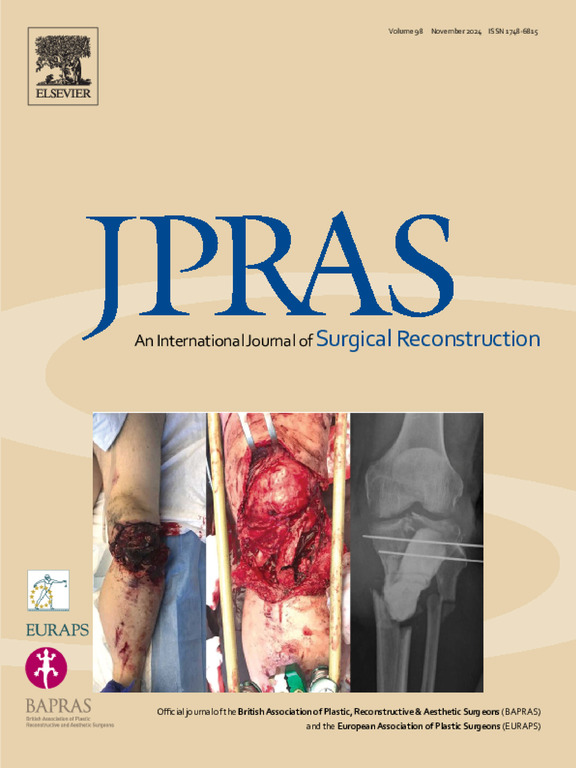性别确认面部手术在种族,民族和社会经济不同的个体:在一个大队列的程序和结果的变化和一致性。
IF 2.4
3区 医学
Q2 SURGERY
Journal of Plastic Reconstructive and Aesthetic Surgery
Pub Date : 2025-08-11
DOI:10.1016/j.bjps.2025.08.003
引用次数: 0
摘要
背景:性别确认面部手术(GAFS)是性别确认护理连续体的一个组成部分,但获得手术的机会有限,只有7%的跨性别女性接受了GAFS。种族/民族和保险覆盖范围的交集显著影响了获得gaf的机会。许多保险计划不包括GAFS,在美国,绝大多数GAFS手术都是在白人患者身上进行的。因此,不同个体的GAFS数据有限。方法:对2019年至2023年在加州大学旧金山分校(UCSF)接受GAFS的跨性别女性进行回顾性图表回顾。采用回顾性图表法收集资料,采用r法进行统计分析。结果:168名跨性别女性在研究期间发生了GAFS。该队列具有种族/民族多样性,其中西班牙裔占39.9%,白人占30.4%,亚裔占6.5%,黑人占6%,其他/多种/未知占17.3%。保险类型也多种多样,其中71.9%为医疗保险,12%为医疗保险,11.4%为私人保险,4.8%为其他/未知保险。医疗并发症发生率为11.3%,修改率为22.6%,不同种族/族裔群体之间没有差异。然而,黑人和西班牙裔患者比其他群体更有可能接受鼻整形和软组织手术。手术总次数和手术阶段数均未被发现是医学并发症或未来翻修手术的重要预测因素。结论:本研究表明,GAFS在种族、民族和社会经济不同的个体中是安全有效的,种族和民族背景会影响所实施的具体GAFS程序。本文章由计算机程序翻译,如有差异,请以英文原文为准。
Gender-affirming facial surgery in racially, ethnically, and socioeconomically diverse individuals: Variations and consistencies in procedures and outcomes in a large cohort
Background
Gender-affirming facial surgery (GAFS) is an integral part of the gender-affirming care continuum, but access to surgery is limited, and only 7% of transgender women have undergone GAFS. The intersection of race/ethnicity and insurance coverage significantly impacts access to GAFS. Many insurance plans exclude GAFS, and a vast majority of GAFS operations in the United States have been performed on White patients. Accordingly, there are limited data on GAFS in diverse individuals.
Methods
A retrospective chart review identified transgender women who underwent GAFS at the University of California, San Francisco (UCSF) between 2019 and 2023. Data were collected via retrospective chart review, and statistical analyses were performed using R.
Results
168 transgender women had GAFS during the study period. The cohort was racially/ethnically diverse, with 39.9% Hispanic, 30.4% White, 6.5% Asian, 6% Black, and 17.3% Other/Multiple/Unknown. Insurance type was also diverse, with 71.9% MediCal, 12% Medicare, 11.4% Private, and 4.8% Other/Unknown.
The rate of medical complications was 11.3% and the rate of revisions was 22.6%, with no differences observed across different racial/ethnic groups. However, Black and Hispanic patients were more likely to undergo rhinoplasty and soft tissue procedures than other groups. Neither the total number of procedures nor the number of stages was found to be a significant predictor of medical complications or future revision operations.
Conclusions
This study demonstrated that GAFS is safe and effective in racially, ethnically and socioeconomically diverse individuals, and that racial and ethnic background influences the specific GAFS procedures performed.
求助全文
通过发布文献求助,成功后即可免费获取论文全文。
去求助
来源期刊
CiteScore
3.10
自引率
11.10%
发文量
578
审稿时长
3.5 months
期刊介绍:
JPRAS An International Journal of Surgical Reconstruction is one of the world''s leading international journals, covering all the reconstructive and aesthetic aspects of plastic surgery.
The journal presents the latest surgical procedures with audit and outcome studies of new and established techniques in plastic surgery including: cleft lip and palate and other heads and neck surgery, hand surgery, lower limb trauma, burns, skin cancer, breast surgery and aesthetic surgery.

 求助内容:
求助内容: 应助结果提醒方式:
应助结果提醒方式:


